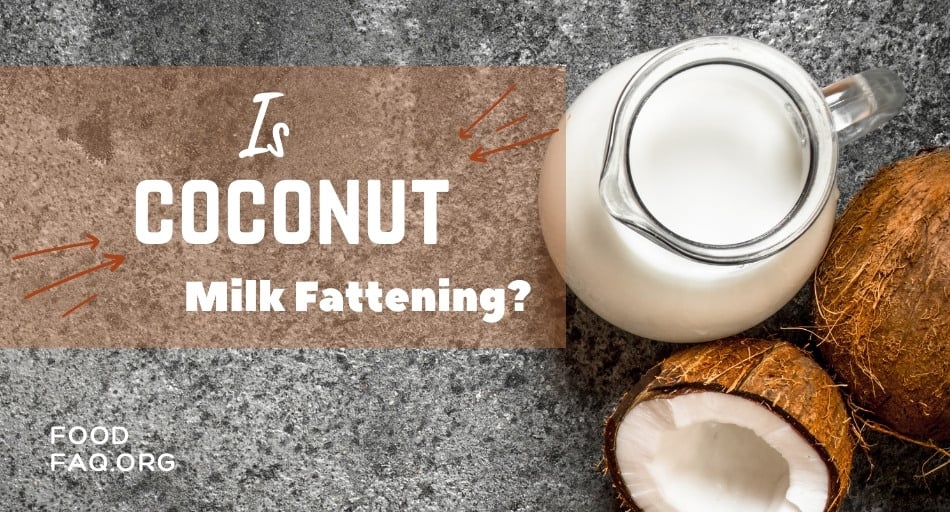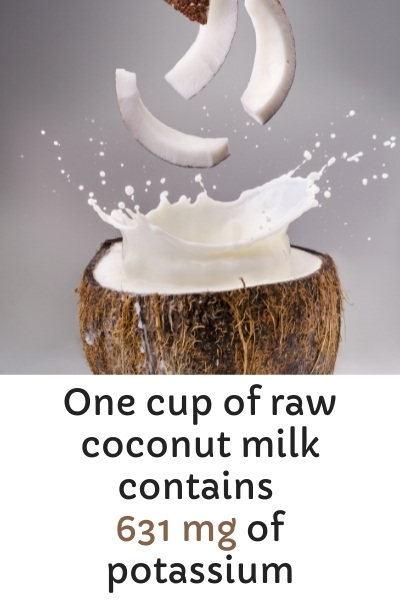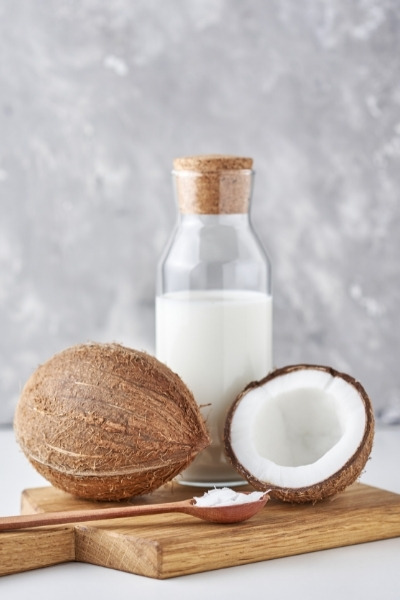Coconut milk has become quite popular in recent years. It’s made with grounded coconut water and meat, creating a creamy substance.

Drinking coconut milk and adding it to your diet has been linked to some wonderful health benefits, increasing its popularity.
However, most calories in coconut milk come from fat. So, this worries people who are trying to lose weight.
So, is coconut milk fattening? Should you avoid it on a weight loss diet?
Table of Contents
Is coconut milk fattening?
Coconut milk provides you with a lot of calories in a single serving. As a result, people trying to lose weight often avoid it in fear of stalling their progress or gaining even more weight. But consuming some coconut milk can actually boost weight loss if done in moderation.
This is because coconut milk contains a lot of important nutrients, such as essential fatty acids that aid in weight loss. So, drinking it might not be as bad as you think.
How many calories are in coconut milk?
One cup of raw coconut milk contains around 552 calories, which is quite a lot. Most people don’t drink glasses of coconut milk, though, so you’re more likely to consume fewer calories.
For example, three tablespoons of coconut milk contain 104 calories. Coconut milk is often added to various meals and desserts as a sweetener.

So, in those cases, you’re definitely consuming fewer calories.
One cup of canned coconut milk contains 445 calories, and three tablespoons provide you with 89 calories.
While this is a slightly lower number, coconut milk is always very calorie-dense. What’s more, some brands might have added fat and preservative, which further increase the calories.
So, always make sure to read the nutritional label and choose the healthiest options out there.
Is coconut milk good for you?
Most calories in coconut milk come from saturated fat. Because of that, people often think that adding it to your diet can raise your risk of heart disease.
But studies actually show that eating foods containing the type of fat found in coconut milk lowers ‘bad’ cholesterol levels, reducing your risk of heart disease.
What’s more, many similar studies show the same results. So, adding coconut milk to your diet in small quantities can reduce your risk of various cardiovascular conditions.

Compounds found in coconut milk have also been shown to reduce inflammation in your body and improve the health of your joints.
Experts believe it has something to do with the plant compounds they provide you with. Inflammation, especially when it becomes chronic, is really bad for your health.
So, including foods that prevent that in your diet is incredibly beneficial for your overall health.
Coconut milk also contains lauric acid. This type of acid has been known to prevent viruses and bacteria from causing infections and diseases.
These can also fight against microorganisms and bacteria found in your mouth, lowering your risk of several mouth- and teeth-related conditions.
While more studies need to be conducted, the ones available recommend adding coconut milk to your diet, even if in small quantities.
Drinking and adding coconut milk to your diet can also help you load up on potassium. This is one of the most important minerals in your body. It helps regulate fluid balance, muscle contractions, and nerve signals.

Potassium also helps offset the negative effects of sodium on your blood pressure, reducing the risk of stroke and heart attacks.
This is an important health benefit, as many people these days struggle with high blood pressure (hypertension) and are deficient in potassium.
Another mineral that coconut milk provides you with is manganese. It helps in forming connective tissue, bones, blood-clotting factors, and even sex hormones.
It’s also crucial for turning fat and carbohydrates into energy and ensuring the proper absorption of calcium.
Since there’s some calcium in coconut milk, having coconut milk in your diet helps you get the most out of both of these minerals.
Should you drink coconut milk when trying to lose weight?
Overall, coconut milk isn’t a weight loss-friendly food. But drinking it in small quantities or using it as a sweetener in small amounts shouldn’t prevent you from losing weight.
This is because it’s very high in fat, so it packs a lot of calories in a single serving. In order to lose weight, you have to be in a calorie deficit, which is hard to do when you eat a lot of high-calorie foods.
Coconut milk contains very little fiber (only about 1 g in three tablespoons). Fiber contributes to weight loss, so in that sense, coconut milk isn’t a great weight loss-friendly food.
You would have to drink a lot of coconut milk and consume too many calories to get a decent amount of fiber from coconut milk.

Still, that doesn’t mean that you shouldn’t drink coconut milk, as it’s still healthy. Just make sure to do so in moderation.
On the other hand, consuming coconut milk in moderation can help you lose weight in some ways. Firstly, coconut milk contains medium-chain triglycerides (MCTs), which have been linked to weight loss.
These compounds contribute to heat production, which boosts your metabolism, leading to weight loss.
MCTs may also improve the health of your digestive system, curb your appetite, and improve digestion, which helps with weight loss even more.
Is coconut water fattening?
Coconut water is very low in calories. One cup contains only 46 calories, depending on the brand.
This is very low, so drinking coconut water on a weight loss-friendly diet is a good idea. It’s also loaded with potassium, magnesium, and manganese, which work as electrolytes, contributing to proper hydration.
Staying hydrated is very important for weight loss, so coconut water can be beneficial.
Conclusion
While coconut milk isn’t fattening in itself, it does contain a lot of calories in a single serving. So, if you’re trying to lose weight, make sure to consume coconut milk in moderation.
On the bright side, it contains many important nutrients that may contribute to healthy weight loss.
So, if you include small amounts of this type of milk, you may reap some weight loss-friendly health benefits.
